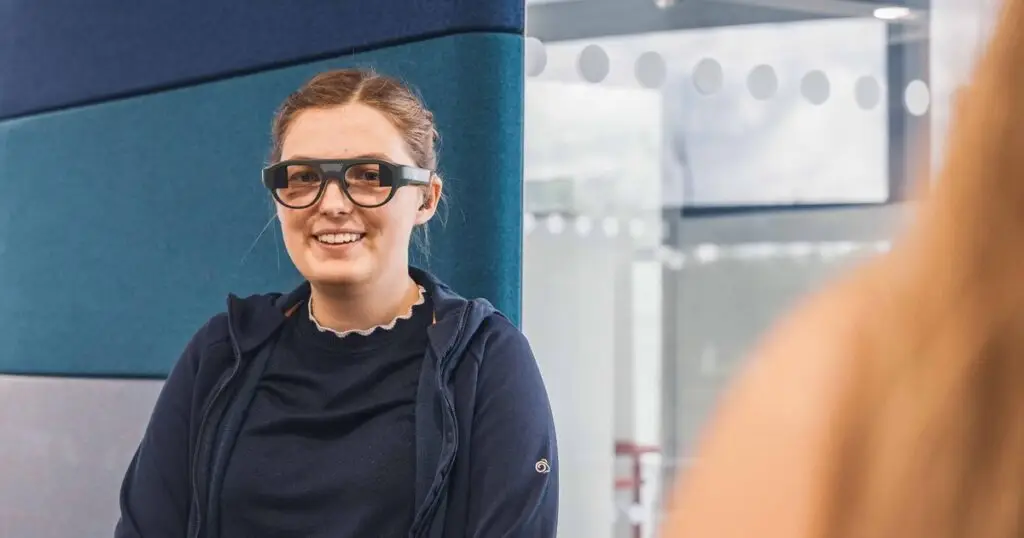The Ministry of Defence (MoD) is trialling advanced augmented reality (AR) glasses in Bristol to assist employees with hearing impairments. This cutting-edge technology aims to enhance communication by projecting real-time conversations onto the lens, thereby eliminating the need for lip reading or interpreters.
The three-month pilot at MoD Abbey Wood involves high-tech glasses capable of translating over 90 languages, aimed at creating a more inclusive work environment. The initiative forms part of a broader commitment to support the deaf and hearing-impaired community within the MoD.
Innovative Technology for Enhanced Communication
High-tech glasses that project real-time conversations onto the lens are being trialled in Bristol by government employees with hearing difficulties. The pioneering eyewear uses augmented reality to allow users to engage directly in dialogue rather than relying on lip reading or a British Sign Language (BSL) interpreter.
The glasses cost £900 a pair and can also be configured to translate conversations in over 90 different languages. If successful, the scheme will be rolled out across the MoD and potentially other government departments.
Pilot Programme at MoD Abbey Wood
The three-month pilot is taking place at MoD Abbey Wood, the Bristol-based headquarters of Defence Equipment and Support (DE&S) – the procurement arm of the MoD. This programme is crucial for evaluating the glasses’ effectiveness in various scenarios, including one-on-one conversations, group settings, and environments with significant background noise.
If the pilot proves successful, it could lead to a larger rollout, benefitting more personnel across different departments. This step is critical to understanding the broader implications of implementing such technology on a wider scale.
Commitment to an Inclusive Environment
Andy Start, DE&S chief executive, emphasised the department’s dedication to an inclusive working environment. He stated, “At DE&S we are committed to an inclusive working environment where everyone can thrive and reach their full potential.”
This pilot will determine if this technology can help staff do their job to the best of their ability. It’s part of a broader strategy to ensure that all employees, regardless of their hearing capabilities, have equal opportunities to succeed.
User Feedback and Adaptations
Under the £10,000 contract with Canada-based XRAI Glass, eight sets of glasses will be available to book as a priority by members of DE&S’s deaf and hearing loss community.
The pilot will gather feedback from various users to understand how the glasses perform in different settings. This feedback is essential for making necessary adaptations and improvements to the technology tailored to the users’ needs.
Real-World Applications and Challenges
Catherine Wrigley, who works in helicopter safety governance, highlighted the practical benefits of the glasses. She explained that having subtitles displayed in her line of sight would help stop “the tennis match” in meetings as she tries to find who is speaking.
“Other available software for subtitles can be very inaccurate and state things like ‘having a pasty’ when in fact it’s ‘having capacity’,” she explained. The new glasses aim to address these inaccuracies and provide real-time, reliable transcription.
Leadership and Insights
Chris Chennell, a senior architect in the DE&S digital delivery team, leads the pilot. He expressed his amazement at the learning experience, stating, “As someone who does not struggle with hearing, this project has been an incredible learning experience for me and one that has become very important to me.”
The initial feedback has been really encouraging, and I’m very hopeful this will prove to be a really positive addition for our staff. The next three months will gather more feedback to help us determine the best way to assist our hearing-impaired colleagues, whether it’s through this technology or something else.”
Future Prospects
If the pilot is successful, the glasses may be adopted by more government departments, significantly benefiting employees with hearing impairments across various sectors.
This innovation not only has the potential to improve day-to-day work for those with hearing loss but also sets a precedent for the adoption of similar technologies in other areas.
The trial of AR glasses by the MoD represents a significant step towards inclusivity and technological advancement in the workplace. The feedback and lessons learned from this pilot could shape the future implementation of assistive technologies across various government departments.
By addressing the unique challenges faced by employees with hearing impairments, the MoD is paving the way for a more inclusive and supportive work environment. This initiative underscores the importance of leveraging technology to enhance accessibility and communication for all workers.

